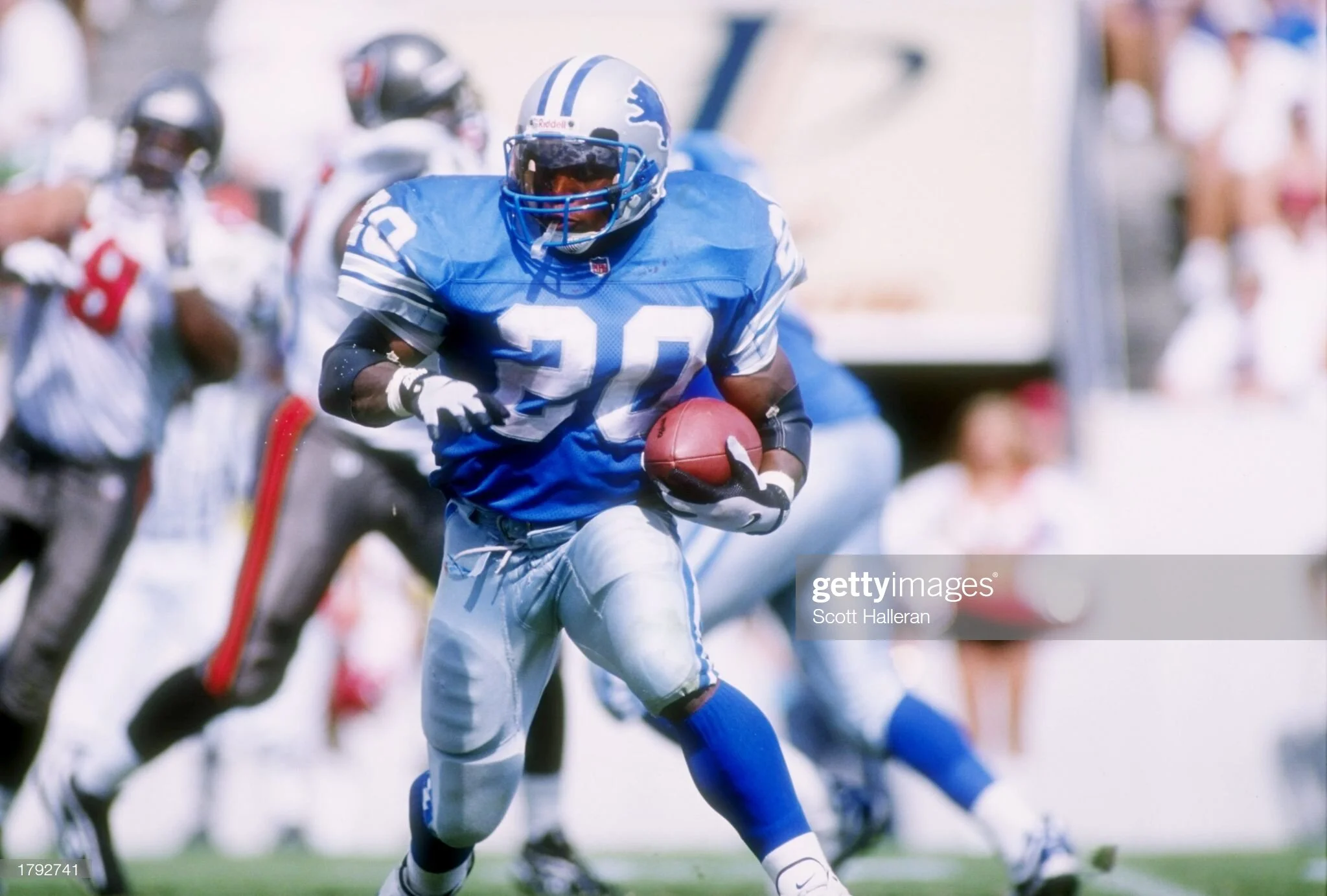Draft History: Lions have had plenty of success but also lost some Hall of Famers
Draft History: Lions have had plenty of success but also lost some Hall of Famers
The Detroit Lions are one of four teams who have never played in the Super Bowl. The team has drafted several Pro Bowlers and even Hall of Famers, but many have found their success with other teams. Some players who meet this criteria include quarterbacks Otto Graham, Y. A. Tittle, Jack Kemp and John Hadl, wide receivers Fred Biletnikoff and Mac Speedie, and safety Johnny Robinson. However, the team has found its all-time leaders in passing, rushing, receiving and sacks in the Draft over the years.
BEST
10. Robert Porcher, DE (Round 1, Pick 26 in 2003) – He is the franchise’s all-time leader with 95½ sacks and 18 forced fumbles. Porcher had five seasons with double-digit sack totals, including a career-high 15 in 1999. The three-time Pro Bowler played in 187 games over 12 years in Detroit.
9. Dick Stanfel, G (Round 2, Pick 19 in 1951) – The Hall of Fame lineman only spent four years with the club, but he played in NFL Championship Games his first three seasons and won two titles. Stanfel was a two-time Pro Bowler and a two-time All-Pro.
8. Alex Karras, DT (Round 1, Pick 10 in 1958) – Despite losing the 1963 season due to a gambling suspension associated with a bar he owned, Karras was a stalwart on Detroit’s defensive line for 12 seasons. The Hall of Famer was also selected to four Pro Bowls and three All-Pro teams, and his 16 fumble recoveries rank fifth in team history. After his playing career, Karras became a sportscaster and actor.
7. Jack Christiansen, S (Round 6, Pick 69 in 1951) – Another Hall of Famer, Christiansen was a part of three Lions NFL Championship teams, including their last title in 1957. In eight seasons, he went to five Pro Bowls, was selected as an All-Pro six times and had 46 interceptions, twice leading the league in title seasons (12 in 1953 and 10 in 1957).
6. Charlie Sanders, TE (Round 3, Pick 74 in 1968) – Nicknamed “Charlie Deep,” Sanders averaged more than 14 yards a catch over 10 NFL seasons. The Hall of Famer was named to seven Pro Bowls and three All-Pro teams, and he holds team records by a tight end for catches (336), yards (4,817) and touchdowns (31).
5. Lem Barney, CB (Round 2, Pick 34 in 1967) – For a team that hasn’t won a title in more than 50 years, they certainly have a lot of Hall of Famers. Included in that list is Barney, who has 56 interceptions in 11 seasons (second in team history behind Dick LeBeau’s 62) and led the league with 10 in 1967 to earn Defensive Rookie of the Year honors. The seven-time Pro Bowler and two-time All-Pro also is tied for second on the franchise list with 17 fumble recoveries.
4. Yale Lary, S/P (Round 3, Pick 34 in 1952) – Another Canton enshrine, Lary was a dual-threat who was one of the league’s best, both as a defensive back and a punter. The three-time champion ranked third in team history with 50 interceptions and also led the NFL in net punting average three times. He was named to nine Pro Bowls and three All-Pro teams.
3. Calvin Johnson, WR (Round 1, Pick 2 in 2007) – As you will see in the “Worst” list, the Lions have had their issues finding good wide receivers in the Draft. That was not the case with Johnson, who tops the franchise list with 731 receptions, 11,619 yards, and 83 touchdowns. “Megatron” was a six-time Pro Bowler and a three-time All-Pro who set an NFL record with 1,964 yards in 2012.
2. Joe Schmidt, LB (Round 7, Pick 86 in 1953) – Another Hall of Famer, Schmidt was a member of three championship teams in 13 seasons with Detroit. The 10-time Pro Bowler and eight-time All-Pro is tied for second in franchise history with 17 fumble recoveries, including a league-leading eight in 1955. Fellow players voted him as the NFL’s most valuable defensive player twice, and he was also named to the 1950s All-Decade Team.
1. Barry Sanders, RB (Round 1, Pick 3 in 1989) – Before today’s players began retiring at younger ages, Sanders set the trend, leaving the game after 10 seasons in 1998. His 15,269 career rushing yards are the most over a 10-year stretch in league history, and he ranked second in league history behind Walter Payton when he retired (he is now fourth). The elusive back made the Pro Bowl every year he was in the league, and he earned six All-Pro selections. He scored 99 career rushing touchdowns and ran for 2,053 yards in 1997 (one of seven 2,000-yard seasons in NFL history), all while making highlight-reel runs nearly every week. Sanders played in the 1991 NFC Championship Game (a Lions loss to the Redskins), but in his book, he cited management’s lack of commitment to winning as the main reason he was retiring.
WORST
10. (tie) Billy Sims, RB (Round 1, Pick 1 in 1980) and Reggie Brown, LB (Round 1, Pick 17 in 1996) – Sims ranks second in franchise history with 5,106 rushing yards, but the 1978 Heisman Trophy winner suffered a catastrophic knee injury during a game in 1984 and he never played again. Another promising career was ended 13 years later. Brown assisted on a tackle of Jets running back Adrian Murrell in the final game of the 1997 season, but his neck was compressed, causing a spinal cord contusion. He was motionless for several minutes on the ground and briefly lost consciousness, but emergency surgery prevented him from requiring a wheelchair and he is now fully mobile.
9. Warren Rabb, QB (Round 2, Pick 15 in 1960) – Rabb led the LSU Tigers to the 1958 National Championship, but did not have the same success as a professional. He did not attempt a pass in seven games as a rookie before spending two seasons with the Bills and one more with the Montreal Alouettes of the Canadian Football League. Pro Bowlers “Dandy” Don Meredith (32nd by the Bears) and Charley Johnson (109th by the Cardinals) were both selected after him.
8. Chuck Long, QB (Round 1, Pick 12 in 1986) – Detroit was struggling with Eric Hipple at quarterback in the mid-1980s, but Long, the 1985 Heisman Trophy runner-up was not the answer. Long went just 4-17 as a starter over six seasons with the Lions and Rams, and he led the NFL with 20 interceptions in 1987. He became a coach after he playing career ended in 1991, and he is currently the quarterbacks coach and offensive coordinator of the new XFL’s St. Louis BattleHawks. Mark Rypien, a two-time Pro Bowler, and the Super Bowl XXVI MVP with the Redskins was taken well after Long (pick 146).
7. Lynn Boden, G (Round 1, Pick 13 in 1975) – Boden split four Detroit seasons between right and left guard before moving on to Chicago. After one year with the Bears, he was out of football. Star offensive linemen were hard to find in the 1975 Draft, but four went to multiple Pro Bowls (the Rams selected two-time Pro Bowl tackle Doug France at 20; Dallas took four-time Pro Bowl tackle Pat Donovan at 90 and three-time Pro Bowler and two-time All-Pro guard Herbert Scott in the 13th round; and the Jets grabbed two-time Pro Bowl center Joe Fields in round 14).
6. Luther Bradley, CB (Round 1, Pick 11 in 1978) – The member of Notre Dame’s 1977 National Championship team had seven interceptions his first two seasons, but found much greater success in the USFL. Bradley was the all-time leader with 28 picks in three-years before the league folded, including 12 with the Chicago Blitz in the USFL’s first season in 1983. However, he didn’t return to the NFL afterward.
5. Mike Williams, WR (Round 1, Pick 10 in 2005) – Before Calvin Johnson arrived, the Lions used several picks on wide receivers hoping to find a star. One of those selections was Williams, who lasted just two unproductive seasons in Detroit. He had his best season with 65 catches and 751 yards with the Seahawks in 2010. Williams had initially been ruled eligible for the 2004 Draft after his sophomore season when Ohio State running back Maurice Clarett won his eligibility case, but the United States Court of Appeals overturned the decision, and both Clarett and Williams had to wait a year. He is now a high school coach in his home state of Florida. Multiple-time Pro Bowlers Roddy White (27th by the Falcons) and Vincent Jackson (61st by the Chargers) were both available at this spot.
4. Andre Ware, QB (Round 1, Pick 7 in 1990) – Detroit head coach Wayne Fontes wanted to pair Ware, who won the 1989 Heisman Trophy, with Barry Sanders, the 1988 winner, but the results were not good. Ware couldn’t grasp the offense as well as the Lions hoped, so Fontes used Rodney Peete and Erik Kramer instead. Ware played in just 14 games over his four-year NFL career, amassing a 3-3 record as a starter. He played three more years in the CFL and one with NFL Europe in Berlin before becoming a broadcaster.
3. Joey Harrington, QB (Round 1, Pick 3 in 2002) – The 2001 Heisman Trophy finalist was also in the running for the top pick, which the Texans used on David Carr. Harrington threw for more than 2,000 yards in each of his six NFL seasons, but tossed just 79 touchdowns passes and had a 26-50 career record, including an 18-37 mark with Detroit. He spent four years with the Lions to mixed results. Experts and fans seem to split the blame between Harrington, head coach Steve Mariucci and Lions management for the team’s poor performance for a full decade (my money is on CEO, team president, and general manager Matt Millen, who was responsible for these poor choices form 2001-08).
2. Reggie Rogers, DT (Round 1, Pick 7 in 1987) – The 1986 All-American from the University of Washington made some poor choices outside the game of football. Emotional problems limited him to six games as a rookie, and the Lions released him after he was driving drunk and caused a car crash that killed three teenagers. He spent 13 months in prison for vehicular manslaughter and went to the CFL after two uneventful seasons with Buffalo and Tampa Bay. He was arrested five times for DUI in the state of Washington and was found dead in his home in 2013 with a mix of alcohol and cocaine in his system.
1. Charles Rogers, WR (Round 1, Pick 2 in 2003) – After the failed Williams pick, the Lions tried again with Rogers, an All-American who won the Biletnikoff Award as the best college receiver in 2002. He broke his clavicle in each of his first two seasons (which led to an addiction to prescription opioids), and then was suspended for the first four games in 2005 for a third violation of the league’s substance-abuse policy. Rogers totaled 440 yards in his three years with Detroit, which turned out to be his only ones in the NFL. He had quite a few off-the-field issues as well. He was ordered to pay back $6.1 million of his signing bonus to the Lions thanks to his suspension (which he never did). Rogers also fathered eight children with two different women, including two while he was still in high school, and also had two DUI arrests. He died in November 2019 due to complications from liver cancer.
Next week: New York Giants


